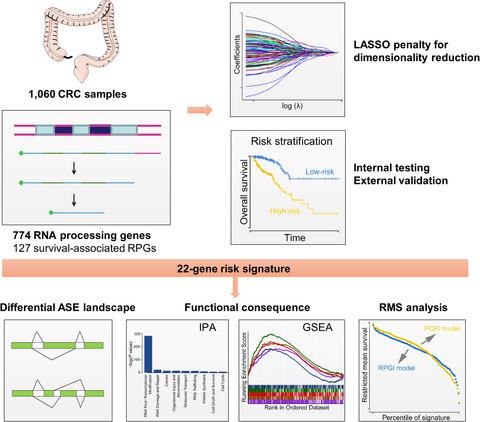当前位置:
X-MOL 学术
›
Cell Prolif.
›
论文详情
Our official English website, www.x-mol.net, welcomes your feedback! (Note: you will need to create a separate account there.)
RNA processing genes characterize RNA splicing and further stratify colorectal cancer
Cell Proliferation ( IF 8.5 ) Pub Date : 2020-06-28 , DOI: 10.1111/cpr.12861 Xiaofan Lu 1 , Yujie Zhou 2 , Jialin Meng 3, 4 , Liyun Jiang 1, 5 , Jun Gao 1 , Yu Cheng 1 , Hangyu Yan 1 , Yang Wang 6 , Bing Zhang 6 , Xiaobo Li 2 , Fangrong Yan 1
Cell Proliferation ( IF 8.5 ) Pub Date : 2020-06-28 , DOI: 10.1111/cpr.12861 Xiaofan Lu 1 , Yujie Zhou 2 , Jialin Meng 3, 4 , Liyun Jiang 1, 5 , Jun Gao 1 , Yu Cheng 1 , Hangyu Yan 1 , Yang Wang 6 , Bing Zhang 6 , Xiaobo Li 2 , Fangrong Yan 1
Affiliation

|
Abstract Objectives Due to the limited evaluation of the prognostic value of RNA processing genes (RPGs), which are regulators of alternative splicing events (ASEs) that have been shown to be associated with tumour progression, this study sought to determine whether colorectal cancer (CRC) could be further stratified based on the expression pattern of RPGs. Materials and Methods The gene expression profiles of CRCs were collected from TCGA (training set) and three external validation cohorts, representing 1060 cases totally. Cox regression with least absolute shrinkage and selection operator (LASSO) penalty was used to develop an RNA processing gene index (RPGI) risk score. Kaplan‐Meier curves, multivariate Cox regression and restricted mean survival (RMS) analyses were harnessed to evaluate the prognostic value of the RPGI. Results A 22‐gene RPGI signature was developed, and its risk score served as a strong independent prognostic factor across all data sets when adjusted for major clinical variables. Moreover, ASEs for certain genes, such as FGFR1 and the RAS oncogene family, were significantly correlated with RPGI. Expression levels of genes involved in splicing‐ and tumour‐associated pathways were significantly correlated with RPGI score. Furthermore, a combination of RPGI with age and tumour stage resulted in significantly improved prognostic accuracy. Conclusions Our findings highlighted the prognostic value of RPGs for risk stratification of CRC patients and provide insights into specific ASEs associated with the development of CRC.
中文翻译:

RNA加工基因表征RNA剪接并进一步对结直肠癌进行分层
摘要 目的 由于 RNA 加工基因 (RPGs) 的预后价值评估有限,RPGs 是已被证明与肿瘤进展相关的选择性剪接事件 (ASEs) 的调节因子,本研究试图确定结直肠癌 (CRC) ) 可以根据 RPG 的表达模式进一步分层。材料与方法 从 TCGA(训练集)和三个外部验证队列中收集 CRC 的基因表达谱,共代表 1060 例病例。使用具有最小绝对收缩和选择算子 (LASSO) 惩罚的 Cox 回归来开发 RNA 加工基因指数 (RPGI) 风险评分。Kaplan-Meier 曲线、多变量 Cox 回归和受限平均生存 (RMS) 分析被用来评估 RPGI 的预后价值。结果开发了一个 22 基因的 RPGI 特征,当针对主要临床变量进行调整时,其风险评分可作为所有数据集的一个强有力的独立预后因素。此外,某些基因(如 FGFR1 和 RAS 癌基因家族)的 ASE 与 RPGI 显着相关。参与剪接和肿瘤相关通路的基因表达水平与 RPGI 评分显着相关。此外,RPGI 与年龄和肿瘤分期的结合显着提高了预后的准确性。结论我们的研究结果强调了 RPG 对 CRC 患者风险分层的预后价值,并提供了对与 CRC 发展相关的特定 ASE 的见解。当针对主要临床变量进行调整时,其风险评分在所有数据集中作为一个强有力的独立预后因素。此外,某些基因(如 FGFR1 和 RAS 癌基因家族)的 ASE 与 RPGI 显着相关。参与剪接和肿瘤相关通路的基因表达水平与 RPGI 评分显着相关。此外,RPGI 与年龄和肿瘤分期的结合显着提高了预后的准确性。结论我们的研究结果强调了 RPG 对 CRC 患者风险分层的预后价值,并提供了对与 CRC 发展相关的特定 ASE 的见解。当针对主要临床变量进行调整时,其风险评分在所有数据集中作为一个强有力的独立预后因素。此外,某些基因(如 FGFR1 和 RAS 癌基因家族)的 ASE 与 RPGI 显着相关。参与剪接和肿瘤相关通路的基因表达水平与 RPGI 评分显着相关。此外,RPGI 与年龄和肿瘤分期的结合显着提高了预后的准确性。结论我们的研究结果强调了 RPG 对 CRC 患者风险分层的预后价值,并提供了对与 CRC 发展相关的特定 ASE 的见解。参与剪接和肿瘤相关通路的基因表达水平与 RPGI 评分显着相关。此外,RPGI 与年龄和肿瘤分期的结合显着提高了预后的准确性。结论我们的研究结果强调了 RPG 对 CRC 患者风险分层的预后价值,并提供了对与 CRC 发展相关的特定 ASE 的见解。参与剪接和肿瘤相关通路的基因表达水平与 RPGI 评分显着相关。此外,RPGI 与年龄和肿瘤分期的结合显着提高了预后的准确性。结论我们的研究结果强调了 RPG 对 CRC 患者风险分层的预后价值,并提供了对与 CRC 发展相关的特定 ASE 的见解。
更新日期:2020-06-28
中文翻译:

RNA加工基因表征RNA剪接并进一步对结直肠癌进行分层
摘要 目的 由于 RNA 加工基因 (RPGs) 的预后价值评估有限,RPGs 是已被证明与肿瘤进展相关的选择性剪接事件 (ASEs) 的调节因子,本研究试图确定结直肠癌 (CRC) ) 可以根据 RPG 的表达模式进一步分层。材料与方法 从 TCGA(训练集)和三个外部验证队列中收集 CRC 的基因表达谱,共代表 1060 例病例。使用具有最小绝对收缩和选择算子 (LASSO) 惩罚的 Cox 回归来开发 RNA 加工基因指数 (RPGI) 风险评分。Kaplan-Meier 曲线、多变量 Cox 回归和受限平均生存 (RMS) 分析被用来评估 RPGI 的预后价值。结果开发了一个 22 基因的 RPGI 特征,当针对主要临床变量进行调整时,其风险评分可作为所有数据集的一个强有力的独立预后因素。此外,某些基因(如 FGFR1 和 RAS 癌基因家族)的 ASE 与 RPGI 显着相关。参与剪接和肿瘤相关通路的基因表达水平与 RPGI 评分显着相关。此外,RPGI 与年龄和肿瘤分期的结合显着提高了预后的准确性。结论我们的研究结果强调了 RPG 对 CRC 患者风险分层的预后价值,并提供了对与 CRC 发展相关的特定 ASE 的见解。当针对主要临床变量进行调整时,其风险评分在所有数据集中作为一个强有力的独立预后因素。此外,某些基因(如 FGFR1 和 RAS 癌基因家族)的 ASE 与 RPGI 显着相关。参与剪接和肿瘤相关通路的基因表达水平与 RPGI 评分显着相关。此外,RPGI 与年龄和肿瘤分期的结合显着提高了预后的准确性。结论我们的研究结果强调了 RPG 对 CRC 患者风险分层的预后价值,并提供了对与 CRC 发展相关的特定 ASE 的见解。当针对主要临床变量进行调整时,其风险评分在所有数据集中作为一个强有力的独立预后因素。此外,某些基因(如 FGFR1 和 RAS 癌基因家族)的 ASE 与 RPGI 显着相关。参与剪接和肿瘤相关通路的基因表达水平与 RPGI 评分显着相关。此外,RPGI 与年龄和肿瘤分期的结合显着提高了预后的准确性。结论我们的研究结果强调了 RPG 对 CRC 患者风险分层的预后价值,并提供了对与 CRC 发展相关的特定 ASE 的见解。参与剪接和肿瘤相关通路的基因表达水平与 RPGI 评分显着相关。此外,RPGI 与年龄和肿瘤分期的结合显着提高了预后的准确性。结论我们的研究结果强调了 RPG 对 CRC 患者风险分层的预后价值,并提供了对与 CRC 发展相关的特定 ASE 的见解。参与剪接和肿瘤相关通路的基因表达水平与 RPGI 评分显着相关。此外,RPGI 与年龄和肿瘤分期的结合显着提高了预后的准确性。结论我们的研究结果强调了 RPG 对 CRC 患者风险分层的预后价值,并提供了对与 CRC 发展相关的特定 ASE 的见解。



























 京公网安备 11010802027423号
京公网安备 11010802027423号